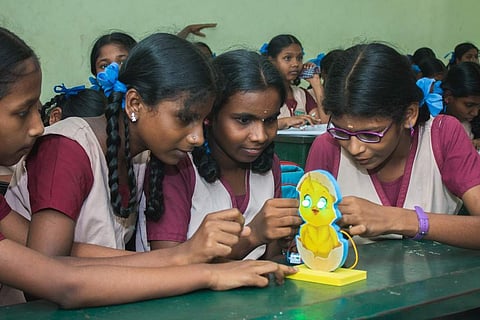

The value and significance of practical learning can never be overemphasised. Numerous accounts of research and case studies have pointed to its effectiveness over the traditional, rote-based learning that our education system has been accustomed to. “Say if we have to learn how to drive a car and we are given a 100-page driving manual and are tutored extensively via lectures and discussions, at the end of which we are given a test. We may do extremely well in the test, but does that mean we are ready to start driving the car? Absolutely not. This is precisely what is happening in our system,” says Nagalakshmi N Vijaykumar, Co-founder of National STEM Education Foundation (NSEF), a not-for-profit organisation set up in 2017 that works towards bringing equity in access to quality educational practices and tools for government schools, corporation schools and village schools.
According to Nagalakshmi, underprivileged children studying in low-income government and corporation schools do not get access to practical learning in the middle grades — Class 6, 7 and 8 — even though the experiments or activities may be mentioned in their textbooks. “Often, there is neither time, space nor the facilities for these children to engage in practical learning in school. They do not have access to it otherwise as well because their ecosystem (parents, friends, relatives) cannot supplement it either," she says, asking, “The schools have instruction manuals, amazing videos, digital aids and so on, but does this guarantee that the child will be equipped enough with the necessary skills? Without understanding these problems, how can we issue blanket statements that the individuals who graduate from this system are not employment-ready?”
It is in order to bridge this theory-practical gap that the National STEM Education Foundation recently introduced the Zero Lab Project in October 2019, a sort of 'lab without a lab' to immerse students in experiential learning. “Traditionally speaking, a lab is associated with physical infrastructure but this project seeks to do away with that because of cost constraints. We use simple tools and learning aids that can lend themselves to multiple uses because, in our earlier STEM interventions, we had observed that replenishing tools and settings was a daunting task that rarely gets done properly, ” Nagalakshmi explains, informing us that in coming up with the Zero Lab Project, they sought to find a way to streamline and standardise the way a practical experiment works, at the same time keeping it low-cost and sustainable.
Through this initiative, any space, even a roofless classroom, can be used to experiment, observe and analyse. The experiments are carried out in such a way that there is a proper structure to these experiments. “For example, for a specific school, we choose a certain number of activities that can be mapped across classes 6, 7 and 8. The experiments that are brought in are always in sync with the curriculum. We make a specific log and verify whether activities are completed by the concerned teacher, whose role in these experiments is that of a facilitator who motivates the child to become curious and ask questions pertaining to the whys and hows related to them,” avers Nagalakshmi, who chose to follow her passion for education after working as a chartered accountant for over 13 years.
“I used to employ practical methods to teach my children and have seen the way they have grasped concepts better. That is how I got talking with one of the parents, Lakshmi (who had working experience as a teacher), and decided to revolutionise education, per se. We founded CURIO KIDZ, a STEM initiative in 2014. It is my firm belief that quality education is not the privilege of a few but the right of every child and this notion led to the formation of the NSEF,” says Nagalakshmi who also runs the popular 'BRAHMA – STEM Fest' for students across Tamil Nadu involving 125-plus schools.
At present, the Zero Lab Project has been implemented in a couple of schools in Chennai, including the Government Girls Higher Secondary School in Ashok Nagar. “At first, we started as a pilot project in a section of class 7 in the Ashok Nagar school. After we saw that it was received well, we moved on to classes 6 to 10. Our aim is to impact 300 students in the coming days,” she adds.
Currently, the cost per student is Rs 1,100 to implement the project, but many schools do not have the budget to cover them. NSEF is raising funds on Milaap to reach out to more schools.
Check out their fundraiser here: https://milaap.org/fundraisers/support-national-stem-education-foundation
